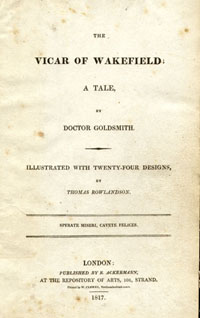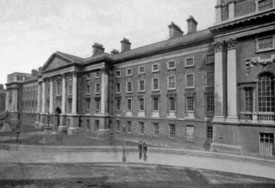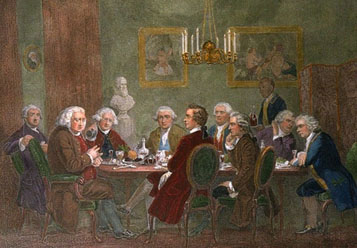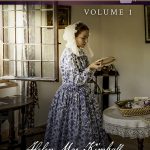Associated Locations:
- (disputed) Either Ballymahon, County Longford, Ireland or Elphin, County Roscommon, Ireland
Associated Dates:
- November 10, 1730 – Born
- 1766 – The Vicar of Wakefield, Published
Oliver Goldsmith is one of the eminent spirits who appeared to President Wilford Woodruff in the St. George Temple on August 21, 1877. This interesting story is detailed in the Eminent Spirits Appear to Wilford Woodruff wiki.
“A pauper in his time and a beloved legend in ours, he wrote a number of enduring literary works. Among his most noted works are the poem “The Deserted Village”, the play She Stoops to Conquer’’, and the novel The Vicar of Wakefield. He portrays in the novel the strengths of home, a humorous view of life, and the highest and enduring principles of human relations. Also reflected in its pages are the virtues of benevolence and faith.”1
“Oh,… if you could but learn to commune with your own hearts and know what noble company you make them, you would little regard the elegance and splendor of the worthless.”
– Oliver Goldsmith
Life Sketch from The Other Eminent Men of Wilford Woodruff
Copyright © Taken from the book: The Other Eminent Men of Wilford Woodruff. Special thanks to Vicki Jo Anderson. Please do not copy.
Irish/English Poet, Playwright, Novelist 1763-1846
From his tragic life, Goldsmith wrote of the refining elements that come from tragedy. Outwardly he suffered; inwardly he was pressed to pure gold. Nothing could change the kindness and generosity of his heart. When Johann Herder recommended to Goethe The Vicar of Wakefield, Goethe pronounced it to be “the best which has ever been written.”
[It] represents the reward of good will and perseverance in the right, strengthens an unconditional confidence in God, and attest the final triumph of good over evil…. Doctor Goldsmith, has without question, great insight into the moral world, into its strength and its infirmities; … I was overpowered by the subject-matter…. The above work had left in me a great impression, for which I could not account; but properly speaking, I felt in harmony with that ironical tone of mind which elevates itself above every object, above fortune and misfortune, good and egil, death and life, and thus attains to the possession of a truly poetical world.
Samuel Johnson said of Goldsmith: “He touched nothing that he did not adorn.”
Early Life
Born in Ireland to a poor farmer, Goldsmith was the second son and one of eight children. He wrote of his father, who was a local curate:
His pleasure increased in proportion to the pleasure he gave; he loved all the world, and he fancied all the world loved him…. He undertook to instruct us himself, and took as much care to form our morals as to improve our understanding. We were told that universal benevolence was what first cemented society; we were taught to consider all the ants of mankind as our own; to regard the human fave divine with affection and esteem.
At three years of age Goldsmith was taught by a good woman, who taught the village children their letters and kept them out of harm’s way. At seven he was sent to the village school. A loyal Irishman, the master of the school expounded Irish verse and folklore, which instilled in Goldsmith a passionate admiration of Irish music and his imagination filled with a store of superstitions and lore. As he grew older, he became a master storyteller, drawing on these early stories to entertain and captivate his audience.
During these school years, Goldsmith contracted smallpox. He survived the disease but was left with a more that usual severity of marks, His appearance was not helped by arms and legs which seamed to long for his small body. At the age of nine he entered a school for older boys, where he suffered greatly for his looks.
He was rather a dull student and remained so throughout his entire formal education, which included a degree from the university. Although his mother had observed flashes of genius in Goldsmith as a child his mediocre school performance seemed less than promising. It would be some time before he matured and gained experience enough to respond to his gifts.
Goldsmith’s naive and trusting nature often put him in embarrassing situations. One day Goldsmith was returning to his father’s home for a visit from school, which was about twenty miles away. The road was impassable to the carriages, so Goldsmith procured a horse to make the trip and a friend loaned him a guinea for traveling expenses. He was now sixteen, he had a horse, and money in his pocket. He was, he though, a man of the world. He determined to play the part.
Instead of hurrying home for the night, he stopped in a nearby town. He detained the first person he saw and asked with as much dignity as he could muster where the best inn could be found. Unfortunately for Goldsmith, he had asked the town jokester. The man, amused at the youth’s attempt of self-confidence, directed him to what was literally the “best house in the place,” namely, the family mansion of a local wealthy landowner, Mr. Featherstone. Goldsmith went to the supposed inn, and in the words of Washington Irving “ordered his horse to be taken to the stable, walked into the parlor, seated himself by the fire, and demanded what he could have for supper.” On ordinary occasions he was diffident and even awkward in his manners, but here he felt called upon to act the experienced traveler, an image which was not characteristic of his stature, for his air and carriage was by no means distinguished. The owner, a man of humor, indulged the youth’s mistake, especially when he accidentally learned that this intruding guest was the son of an old acquaintance.
“Never was [a] schoolboy more elated. When supper was served, he most condescendingly insisted that the landlord, his wife and daughter should partake. His last flourish was on going to bed, when he gave especial orders to have a hot cake at breakfast.” One can only imagine his dismay the next morning when his true situation was revealed to him. Goldsmith dramatized this experience in his well known play She Stoops to Conquer’’.
As a young man Goldsmith attended Trinity College in Dublin, he worked as a sizar because he was to poor to pay his way. As a sizar he had to mop floors every morning, wash dishes, serve meals, and wear a short-sleeved black robe which separated him as a pauper from the other students. Perhaps to make up for his embarrassment, he became the “buffoon” of the class, and created much mischief.
His tutor was violent and unkind. As devoted to math as Goldsmith was to his classics, he abused him in the presence of the class as ignorant and stupid. He ridiculed Goldsmith as awkward, ugly, and at times he used personal violence.
Trying the Ministry
Although Goldsmith was able to graduate with a B.A., he did not know what he wanted to do. A family council decided that with the help of a kind uncle, Thomas Contarine, who would make the appointment, Goldsmith would apply to the clergy. Doing so necessitated a waiting period of two years, during which Goldsmith heped his family and relatives on their farm. He wandered, fished and frequented the local pubs, getting to know the personalities of those who lived in the area and storing them in his memory for later use in his writings. Finally the day came for Goldsmith;s interview with the Bishop. However, Goldsmith, who had little sense of decorum for such situations, showed up in a pair of scarlet breeches, How much this influence his being turned down for the ministry is not known, but it certainly must not have helped.
Lost passage to America
He next tried tutoring but that too came to a sad end. His father died and his mother barely had enough to subsist on, so the relatives, mainly his brother and uncle, collected enough money to help him secure passage to America. This endeavor, too, was ill-fated, for when the winds were favorable the captain set sail, Goldsmith was left behind, sitting at the local inn.
Trying Law
He resolved to try his hand at law, and his patient and supportive uncle advanced him £50. Goldsmith returned to Dublin, but before he could enter school, he lost the money in a game of chance. Money and Goldsmith never stayed together long. If he did not lose it in a game, he would give it to some beggar or hungry child. He was always benevolent, often giving most of his income to the poor.
Trying Medicine
His uncle now felt that he should try medicine. This dear uncle, who never lost faith in Goldsmith’s unconnected genius, once again came to Goldsmith’s aid, helping him go to Edinburgh to the university. He remained three years but left without obtaining a degree. Traveling to the continent, he supported himself with his flute. Playing it usually got him food and a bed for the night with the poor, but rarely with the rich. He observed the lack of freedom and the sure “badge of slavery of the people.” This slavery he predicted was drawing to a rapid close. He prophetically wrote: “I cannot help fancying that the genius of Freedom has entered that kingdom of disguise.
He returned to England with a Doctor’s degree. There is some question as to how the degree was obtained for he had few medical skills. He was therefore unable to adequately practice medicine and sustained himself in the poorest manner with a variety of odd menial jobs. At times he sank into deep despair, but he had what he termed “a knack at hoping” which would soon pull him up again.
Introduced to English Writers
He began doing hack work for a magazine just to eat. His writing eventually began to gain recognition. He was introduced to Samuel Johnson, who was then the first of the English writers, and Joshua Reynolds the first of the original members of the famous literary club. Through his works he rose to a place among the writers of the day that was second only to Johnson. As he had done in the past, Goldsmith shared his new found fortune with the poor. He was nearly evicted from his apartment for lack of payment because all his money had been given to the poor.
Goldsmith’s Works
Goldsmith ranks with the best essayist England ever produced. His novels were unique and original. Particularly his novel The Vicar of Wakefield exemplifies Goldsmith’s remarkable “reputation of books is raised not by their freedom from defect but the greatness of their beauties.”
Goldsmith’s last and unfinished works was “Retaliation,” a poem which was a literary portrait of his fellow club members. He took ill while working on a poem about Reynolds he had only partially finished. He did not recover and died on 4 April 1774. He had just turned forty-six. He was buried in a little churchyard near his home. No stone marked the spot. His funeral was private and mostly just family, attending. However, the way to the cemetery was lined with a number of poor and homeless people who gathered to pay their last respects to the man who had been their benefactor.
The coffin was followed by Edmund Burke and Sir Joshua Reynolds. Burke, when he heard of Goldsmith’s death, burst into a flood of tears. Reynolds was so moved upon receiving the news that he flung aside his brush and palette for the day. Reynolds suggested that a monument honoring Goldsmith be placed in Westminster Abbey. Johnson furnished the inscription. The great actor David Garrick wrote that Goldsmith: “wrote like an angel and talked like a poor Poll.” Johnson, in reflecting on his dear friend said: “Let not his frailties be remembered, he was a very great man.”
Copyright © Taken from the book: The Other Eminent Men of Wilford Woodruff. Special thanks to Vicki Jo Anderson. Please do not copy. 2











